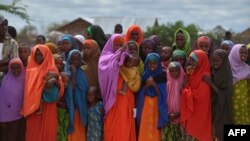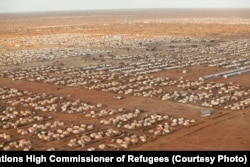The Kenyan government says it plans to close the country's two main refugee camps, a move that would impact some 400,000 refugees.
The government said in a statement Friday that due to national security interests, it "has decided the hosting of refugees has to come to an end."
The two-page statement stopped short of saying refugees will be expelled. However, it said the government has disbanded its Department of Refugee Affairs as a first step, and is working on a mechanism to close the Dadaab and Kakuma camps "within the shortest time possible."
Dadaab, in northeast Kenya, is considered the world's largest refugee camp and currently houses nearly 330,000 people, mostly Somalis. Kakuma, in northwestern Kenya, is home to another 55,000.
Amnesty International called the decision "reckless" and said it would put thousands of innocent lives at risk.
"It could lead to the involuntary return of thousands of refugees to Somalia and other countries of origin, where their lives may still be in danger," said Muthoni Wanyeki, Amnesty International's Regional Director for East Africa. He said the decision by the Kenyan government is "an abdication of its duty to protect the vulnerable."
Kenya's government Friday acknowledged its decision will cause harm to the refugees and said the international community must take steps to minimize their pain and suffering.
It said it was forced to act because of the security challenge posed by militant groups like Somalia's al-Shabab and the slow process of repatriation.
Kenya hosts about 600,000 refugees in all. About three-fourths are from Somalia, with most of the others coming from South Sudan.
Kenya has threatened to close the refugee camps in the past, but never followed through. The U.N. refugee agency warned last year that closing Dadaab and forcing Somali refugees back home would have "extreme humanitarian consequences."
Al-Shabab has carried out several major attacks on Kenyan territory, most notably the 2013 attack on Nairobi's Westgate Mall that killed 67 people and the 2015 attack on a college in the town of Garissa that killed 148.
Shabab began launching attacks in Kenya after Kenyan troops entered Somalia to fight the militant group in 2011.





